![]() 1st Battalion 22nd Infantry
1st Battalion 22nd Infantry ![]()
Memorial cannon for 22nd Commander found in the Philippines
Page One - The Original Monument
|
The original monument to Photo most likely taken at the dedication. Cannon mounted in center,
flanked by It is not known if the sculpted
bust of Egbert If it was part of the original
monument, it has Only the cannon has been found. Photo from: |
The original date of the
establishment of the monument to Colonel Egbert is unknown.
The following proclamation, designating a tract of land as the
Egbert Monument Reserve,
is recorded in the Executive Issuances of the Philippine Government.
The proclamation designates an
area of 10,000 square meters, or one hectare, which is
approximately
two and one half acres in size, as a section of land to be used
only for Egbert's monument.
The proclamation is dated
January 12, 1906. From the wording of the document, it appears
possible
that the monument was already in place, when the land around it
was reserved and dedicated to it,
by this proclamation.
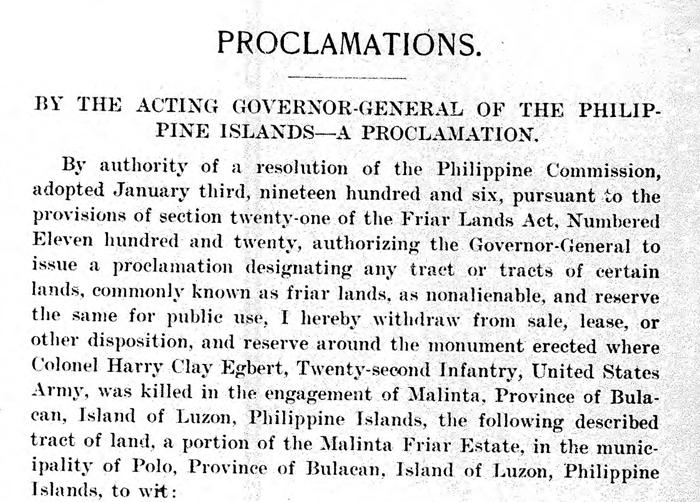
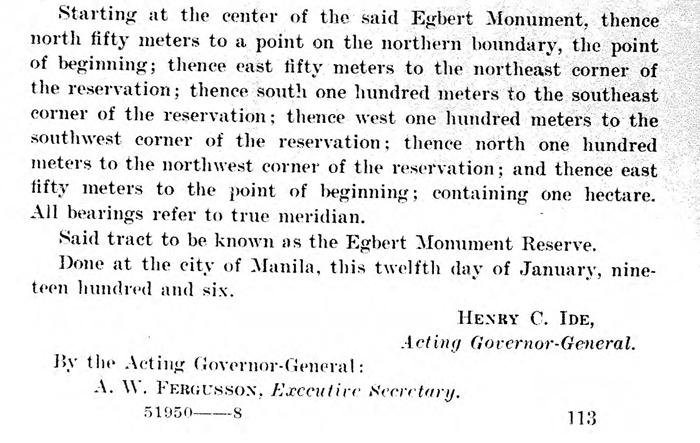 ¹
¹
The proclamation is signed by
Henry Clay Ide, as Acting Governor-General of the Philippines.
Ide was one of the Commissioners of the Taft Commission,
appointed in 1900, to oversee
the establishment of the new government of the Philippines under
US rule. Ide was Acting
Governor-General from November 1905 to March 1906, and was
Governor-General
from March - September 1906.
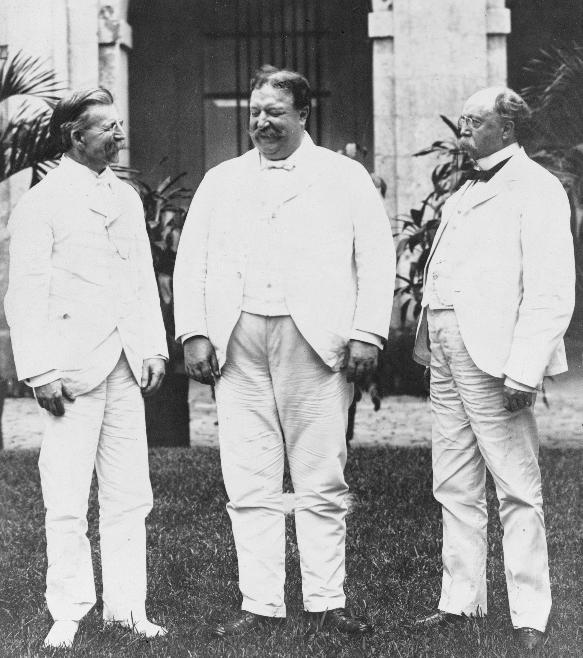
Original members of the Philippine
Commission (Taft Commission) - 1901
Left to right: General Luke E. Wright, William H. Taft, and Judge
Henry C. Ide.
Nine years after this photo was taken, Taft would become the 27th
President of the United States.
Photo from the Library of Congress LC-USZ62-121710
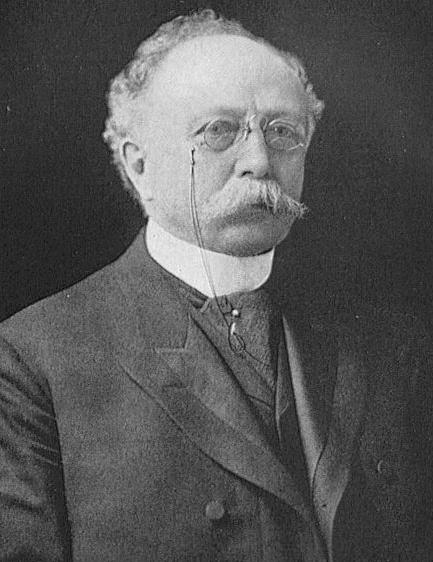
Henry C. Ide, who issued the
Proclamation designating the land around Egbert's monument
as belonging to the monument.
Photo from The Old World and its Ways
by William Jennings Bryan,
The Thompson Publishing Company, St. Louis 1907
Below are two photos of the monument erected in the Philippines for Brigadier General Henry W. Lawton.
The 22nd Infantry had served in
Lawton's Brigade in Cuba, at Siboney, El Caney and Santiago. The
Regiment
again served under him in the Philippines. Lawton was Egbert's
immediate superior when Egbert was killed
while commanding the 22nd Infantry in the Philippines.
Lawton led from the front, and
was killed by an enemy sniper at San Mateo on December 19, 1899,
some seven months after Egbert died.
Lawton was the
highest-ranking U.S. military officer to be killed in action in
the Philippine Insurrection,
and the first serving U.S. general killed in action outside
of North America.
He was a Brigadier General of
Regulars and in the process of being promoted to
Major General the day of his death.
From the photo of Egbert's
monument at the top of this page, it appears that both monuments
were of similar construction. The main differences were that
Egbert's may have included a bust of him,
and the cannon for Lawton's monument had a brass plaque with an
inscription, whereas the
cannon for Egbert's monument had the inscription engraved
directly into the cannon itself.
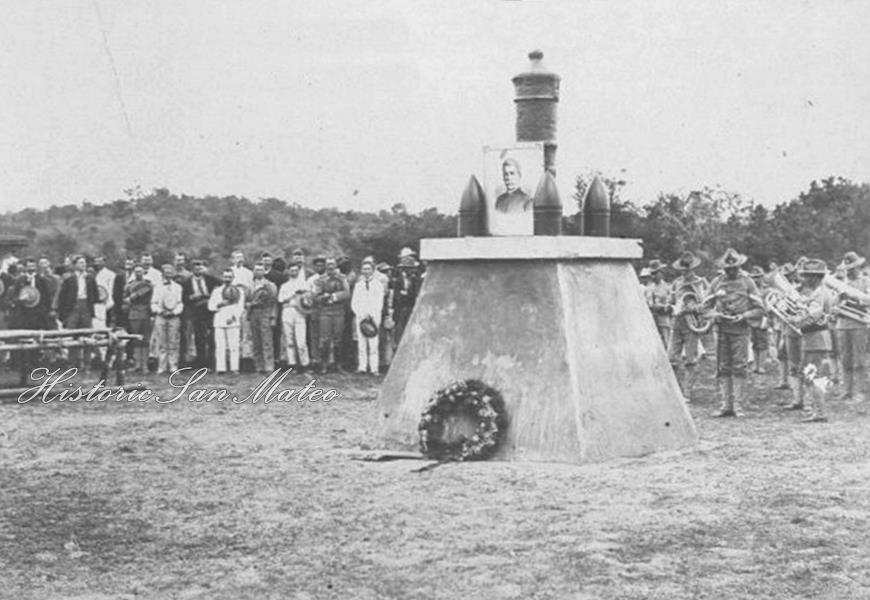
A photo taken at the
dedication of the monument to General Lawton, February 22, 1901.
The monument is on the precise spot where Lawton was killed.
Photo from Richard Rivera, a historian and native of San Mateo, Rizal Philippines
via Kevin Perez
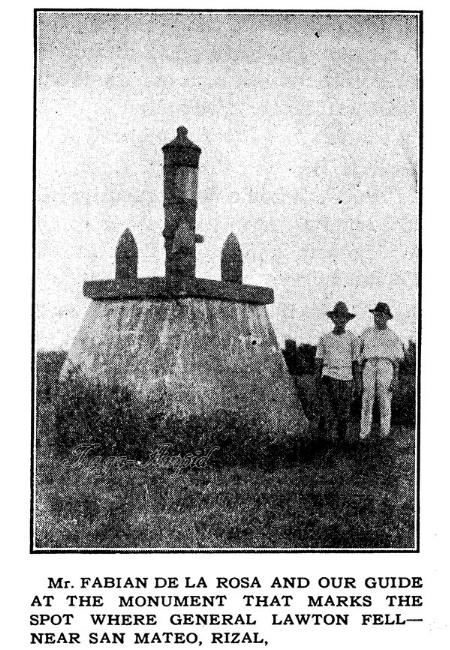
Photo from the early 1900's showing the
monument erected for General Henry Lawton,
who was killed in action in the Philippines. The brass plaque
affixed to the cannon near the top
had the inscription memorializing Gen. Lawton and can be seen in
this view.
Photo from Richard Rivera, a historian and native of San Mateo, Rizal Philippines
via Kevin Perez
¹ The Official Gazette of the Republic of the Philippines
Home | Photos | Battles & History | Current |
Rosters & Reports | Medal of Honor | Killed
in Action |
Personnel Locator | Commanders | Station
List | Campaigns |
Honors | Insignia & Memorabilia | 4-42
Artillery | Taps |
What's New | Editorial | Links |